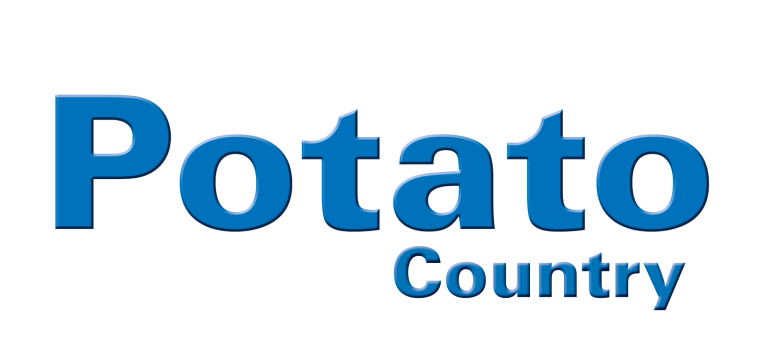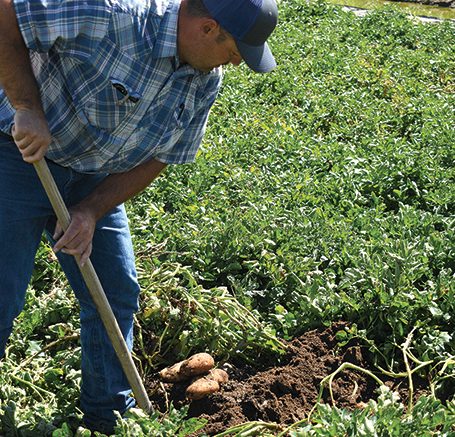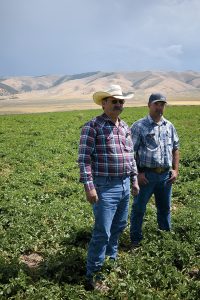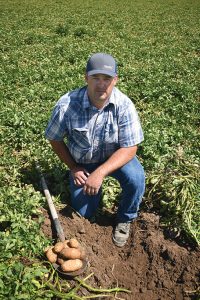Story by Denise Keller, Editor
Photos by Dave Alexander, Publisher
During the last five years, Blake Matthews has made a 180-degree change on his Oakley, Idaho farm. By taking a chance on some little-known products and systematically fine-tuning the farm’s chemical regime, the grower has managed to reduce fertilizer, fumigant and fungicide inputs, as well as eliminate the use of insecticides. And all the while, he’s using social media to share the ongoing efforts and results with friends, family and fellow farmers.
Program on the Fringe
Matthews and his father farm 2,700 acres including 450 acres of potatoes, about 70 percent of which are grown for the processing market. About half of the spuds are Western Russet, 30 percent Russet Burbank and 20 percent Russet Norkotah. Production also includes 350 acres of sugar beets, 1,200 acres of malt barley, 400 acres of corn and 300 acres of alfalfa. The family also raises cattle and operates a feedlot, which is managed by Matthews’ two brothers.
About five years ago, Matthews, along with agronomist Jared Cook, began testing some biological products, mostly from a company called Bio S.I. Technology, as well as fertility products from an Idaho-based company called Redox. Tests included seed treatments, in-furrow applications, insecticide and fungicide replacements, and fumigation alternatives.
Matthews and Cook eventually adopted a standard in-furrow treatment consisting of Mainstay Calcium, Rootex, Bio S.I., Root Rx and TriPlex Micro, along with Quadris and Admire. In ongoing trials, they tested 10 treatments last year, each varying in the combination of products, rates and timing. Matthews brought in Jeff Miller, president of Miller Research, to provide an objective third-party evaluation of the trial.
“Five years ago, we weren’t using any of these products. It’s been a work in progress, but we think we have a fairly decent program put together now,” Matthews says. “Ultimately, what it comes down to is we are trying to manage plant stress.”
It seems to be working. In the last two years, Matthews has been able to eliminate the use of foliar insecticides on potatoes and sugar beets. He attributes this to the use of Mainstay Si, a calcium silicon product from Redox. A side effect of the fertilizer is a toughening of the plant’s leaves that makes it difficult for insects to feed on them, according to the grower.
He has also been able to do away with in-season fungicides, limiting applications to an in-furrow treatment and another at vine-kill.
Overall fertilizer inputs have been reduced, as well. While Matthews increased potassium because he had been short on the nutrient, he has dropped phosphate use by 85 percent and cut back on nitrogen by 25 to 30 percent through the use of high-efficiency products and the utilization of the Ask the Plant testing program from TPS Lab.
“Everybody claims they have a high-efficiency product, but we’ve actually found one that works,” Matthews says.
In addition, he has found that he can forgo fumigation. In two years of testing, potato yields were the same in fumigated ground and non-fumigated ground, but tuber quality was better in the non-fumigated plot. Thus, last fall, Matthews fumigated with Vapam only 25 percent of this year’s potato ground.
With lower input costs and higher yields, Matthews is happy with the program he and Cook have developed, but understands why it hasn’t become standard in the industry.
“It’s a little on the fringe,” the grower admits with a laugh. “Like my dad always said, everybody has a snake oil. Everybody’s tried it, and most of them don’t work. So everybody has a bad taste in their mouths for a lot of these new products, especially if they’re not from your main manufacturers.”
Matthews and his team tested the first new product in potatoes after seeing great results in his sugar beet crop, and gradually added more.
“If a grower is not at least trialing one thing on their farm every year, they’re stagnant,” Matthews says. “Growers have to be not afraid to try something new. You don’t have to go whole hog, but do a good honest trial to see whether it works on your farm or not.”
The grower plans to repeat the trial this year and will continue refining the farm’s program.
Following on Facebook
Social media has given Matthews a platform to share the changes made on his farm. He often posts videos about his in-field trials on Facebook.
“I enjoy sharing what I’ve learned because I’ve had people who have helped me throughout the years. Somebody did it for me, so I need to turn around and do it for somebody else. Pay it forward,” he explains.
Facebook also serves as a venue for educating his non-farming friends about potatoes and agriculture, in general. Many people have misconceptions about farmers, he says. Even people one generation removed from the farm can be unfamiliar with the realities of the industry.
“I think, in a generalized statement, farmers are terrible at PR,” the grower says. “We have our little groups we chat with and bounce ideas off, but as for showing the world, most farmers don’t promote the industry. The problem is if we don’t speak up for ourselves, then everybody is going to automatically think the worst of us.”
Videos showing what it takes to harvest a crop have attracted a lot of interest on Matthews’ Facebook page. Other posts are intended to help provide information about hot topics such as GMOs.
“We’re putting it out there for mainstream America to see that we’re out there trying to make the ground better, do a better job, and keep the food source reliable, clean and safe,” Matthews explains. “People love a good story; tell your story.”




